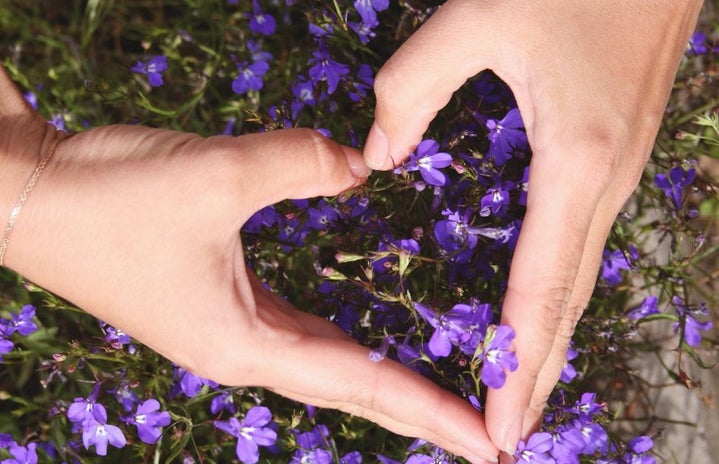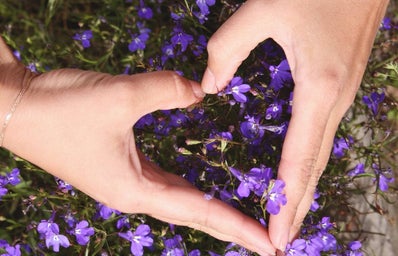As I scroll through numerous colorful posts on social media around LGBT+ Pride month every year, reading things like “Be Yourself” and “Love is Love” and “You Matter,” I always catch myself desperately scanning for a certain familiar purple, gray, black and white flag. More often than not, it’s an asexual flag — which deserves just as much recognition and representation as the rest, and is better than nothing at all — but it doesn’t exactly fit who I perceive myself as. As Pride comes to an end this year, I wanted to give attention to one of the more underrepresented identities on the spectrum.
Demisexuality falls under the “asexual” umbrella. Somebody who identifies as asexual does not experience sexual attraction. If we look at it on a spectrum, with “sexual” on the far left and “asexual” on the far right, there’s a “gray area” in the middle for people in between. Like me. These people are called “graysexuals,” “gray-aces,” or “graces.” Under the “grace” umbrella is demisexuality. It’s important to note that, like squares and rectangles, all demisexuals are graces, but not all graces are demisexual. Somebody who identifies as demisexual only experiences a sexual attraction after a strong emotional bond is formed. “Demiromantic” is the same thing, but instead of sexual attraction, it deals with romantic attraction; they often go hand-in-hand. Because it is a spectrum, a demisexual person can lean more toward either sexual or asexual; I know I personally lean more toward sexual than asexual.
To explain what demisexuality is, we have to explain what demisexuality isn’t.
Demisexuality isn’t:
- Being “normal.”
- Being picky.
- Being prudish.
- Fake.
- A choice.
- Abstinence.
The cool thing about demisexuality is that it isn’t so much about WHOM one is sexually attracted to or HOW MUCH sex one receives, but more so about an individual’s identity and the means of connection itself. Anybody can be demisexual, regardless of their gender or orientation — men, women, non-binaries, heterosexuals, homosexuals, bisexuals, pansexuals, cisgenders, transgenders, etc — all can be demisexual, as well.
I think growing up Catholic set me up for becoming the person I am today. With all due respect to Catholicism, it’s very marriage-centric. You find a partner, you get married, and you make a bunch of Catholic babies. That was my “norm” and that’s how I thought it would come together for me too. Performing in The Rocky Horror Picture Show after high school introduced me to people of all genders, backgrounds, and sexualities that I probably wouldn’t have encountered around my hometown. I was one of the few members who identified as just plain heterosexual, but looking back, I’d known from a really young age that I love differently than the people around me.
I always joke that I never grew out of my “boys are yucky” phase.
One of my most vivid memories from kindergarten is of me sitting with the preppy, popular girls, giggling about a boy they thought was cute, and me giggling along with them in an attempt to fit in, despite not knowing the boy.
I remember when High School Musical (2006) came out and everybody was obsessed with Zac Efron. I put up posters on my wall and tried to force myself to fall in love with him too, even though I didn’t find him attractive at 7 years old (sorry Zac Efron fans).
I had a rough time in high school matching a label to my identity. After doing some research and because I’d never been attracted to a boy before, I thought I could possibly be homosexual or bisexual, but those didn’t feel right. Toward the end of high school, asexuality stood out in the back of my mind. I felt like I didn’t need boys or a relationship to make me happy in life, it wasn’t a priority at the top of my list like most people my age, and sex was definitely something I could go a lifetime without. No, cartoons owned my heart for most of my life (and still do very much) until I met a boy who made me feel the same way cartoons made me feel.
My ex-boyfriend would describe me to his girlfriends as “this girl who’s obsessed with me” and it hurt because I love hard; I don’t know how to not love hard, and I didn’t know why. I sometimes wonder if every man I’ve ever loved thinks the same as him.
The emotional connection that a demisexual person experiences is specific to that person, be it a feeling of romantic love or a deep platonic friendship. The best way I can describe it, for me, is that when I start catching feelings, I’ve usually known the person for a while and I’ll start feeling an intense sense of nurturing and a strong desire to keep them around in my life for a long time. It’s kind of ironic that that’s how those feelings start, but it’s usually not how they end.
Modern dating norms, like dating apps and hookup culture and believing in “love at first sight,” are basically impossible for me because of the need for an emotional connection. I discovered this after my first boyfriend dumped me. I tried to rebound with a kid in our theatre class and it was so uncomfortable — we didn’t last through the day. Another more recent time, I made a dating profile on a dating app in an attempt to get over a polyamorous partner who’d started a new relationship; I probably only had it for about an hour. Moving on is the hardest part of demisexuality for me. I’m very careful when it comes to picking potential partners. Because of the strong emotional bond necessary for me to have feelings in the first place, it’s very hard for me to let go when the time comes.
Until last November, I didn’t have a name for what I felt, other than heterosexual. But it wasn’t only that. I remember spending an entire car ride from Orlando to Tampa trying to explain my feelings to two of my best friends. I knew I liked boys, but why do I feel different from other people who like boys too? Why do I always get attached to boys harder than boys get attached to me? Why can’t I find somebody who loves the same way I do? And why is it so hard for me to just pack up and move onto the next boy after I get hurt? Am I straight and monogamous, or inexperienced, or am I just broken?
One of my friends told me that it sounded like I could be demisexual.
In that moment I was 17 again, back in my boyfriend’s bedroom, crying after being dumped again because I didn’t want to go down on him. I was 17, backstage in my high school auditorium, kissing a boy I hardly knew because I thought things would grow from there. I was 19, laying in bed for the first time with a man I had a massive crush on, petrified to make any move, let alone the first one. I was 20, sitting around a table with friends, uncomfortably listening to them discuss ways to monetize my virginity. Every reaction I’d ever had leading up to that moment finally made sense.
So, I did my research, and I found that I demonstrated many of the qualities of demisexuality.
Another cool thing about demisexuality is that it looks different in everyone. No two demisexual persons are exactly the same and each person has their own individual sexuality. Only you know what you’re experiencing and everybody’s experiences are different. Demisexuality is a label. Some people don’t need labels; they just are. Others feel that labels help them better understand themselves. I’ve always been demisexual inside, but it wasn’t until I found a label that fit me that I began to truly understand what I was experiencing. I never felt the need to make a big “coming out” announcement because I’m still me and everything that I ever was, with or without a label, and I know my feelings are valid.
This year would’ve been my first Pride being openly demisexual, but if we’re being honest, being proud of my sexuality is something I still frequently struggle with. I have days where I don’t feel good or worthy enough to have a partner. I have days where I feel like I wouldn’t have a friendship with certain friend(s) anymore if the sexual aspect ceased to exist or vice versa. I have days where I feel like a fake because I don’t hate sex or being sexual at all. I have days where I still feel like I’m broken because I don’t view sex and love the same way as the people around me. I have days where I look up at the demisexual flag on my wall, heartbroken, and think “this is all your fault.” Alternatively, demisexuality has also taught me how to love myself and be independent and not rely solely on a man for happiness.
Although LGBT+ Pride month only lasts for 30 days, the love and respect for one’s gender, sexuality, and identity — including demisexuality — carries on year-round. If anybody reading this is still curious about demisexuality or thinks they may be demisexual themselves, I encourage you to reach out to me on my social media; I’m more than happy to talk more about it. I also encourage everybody to check out the Demisexual Resource Center on Demisexuality.org. They have the answers to practically any question you may have about demisexuality and you can also meet other demisexual people and allies on their forums!
You are valid in all that you are and all that you feel, and I wish you a very happy Pride!



